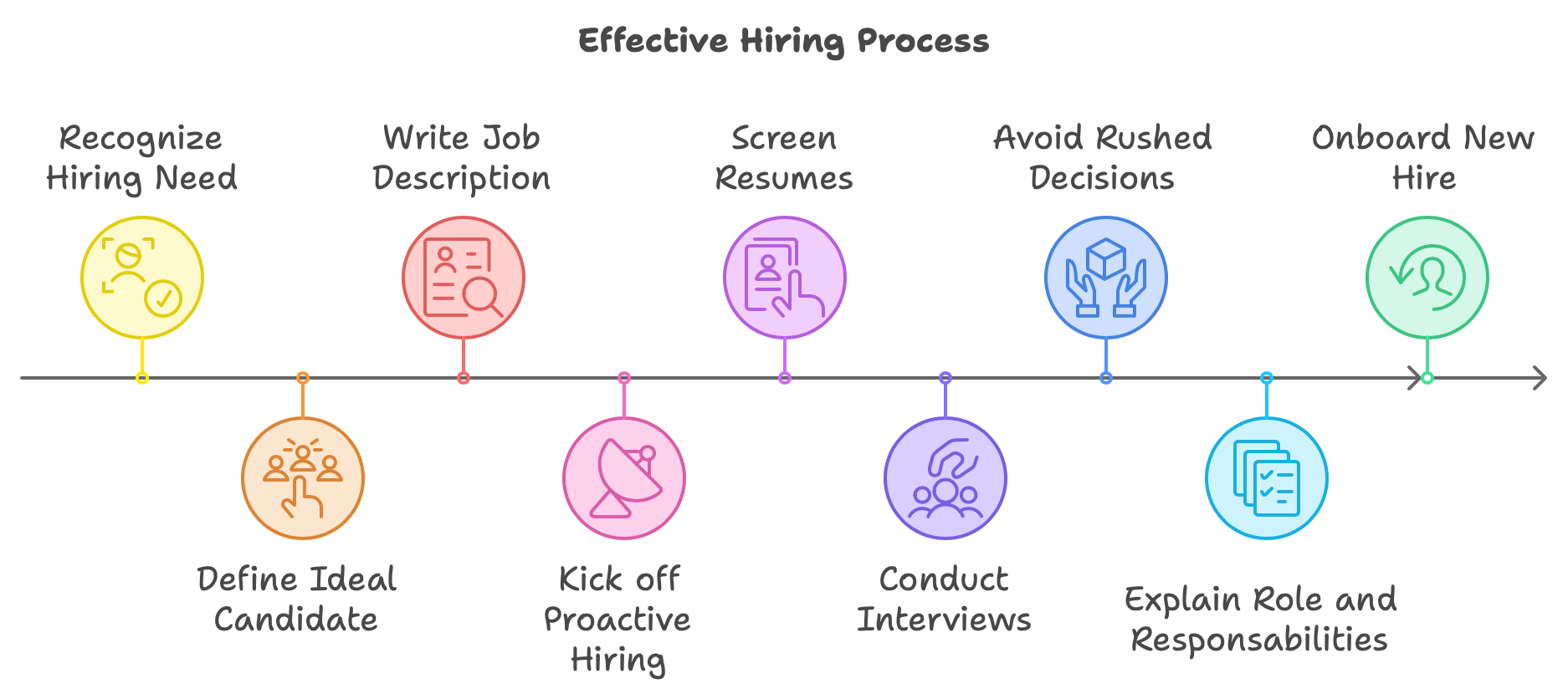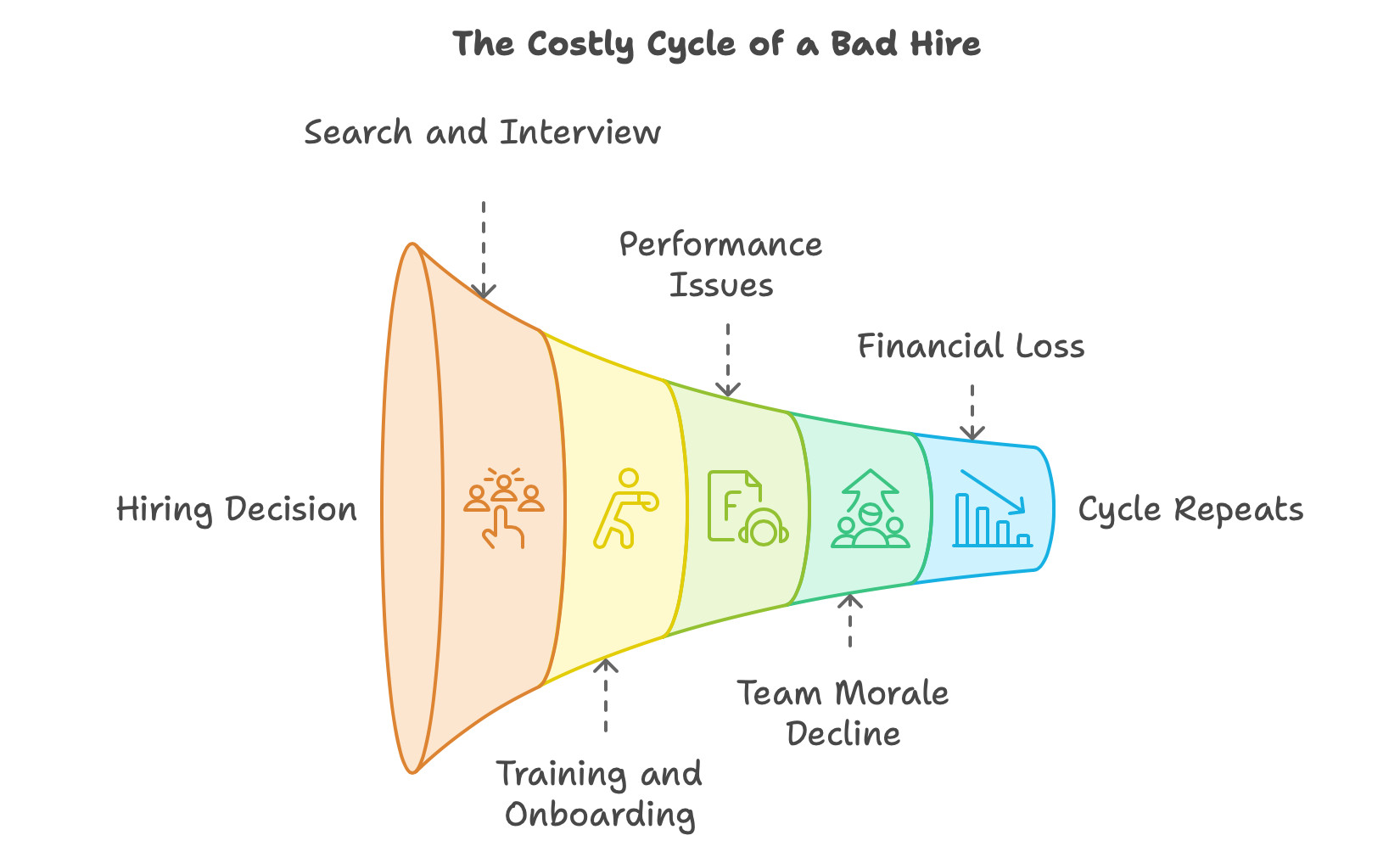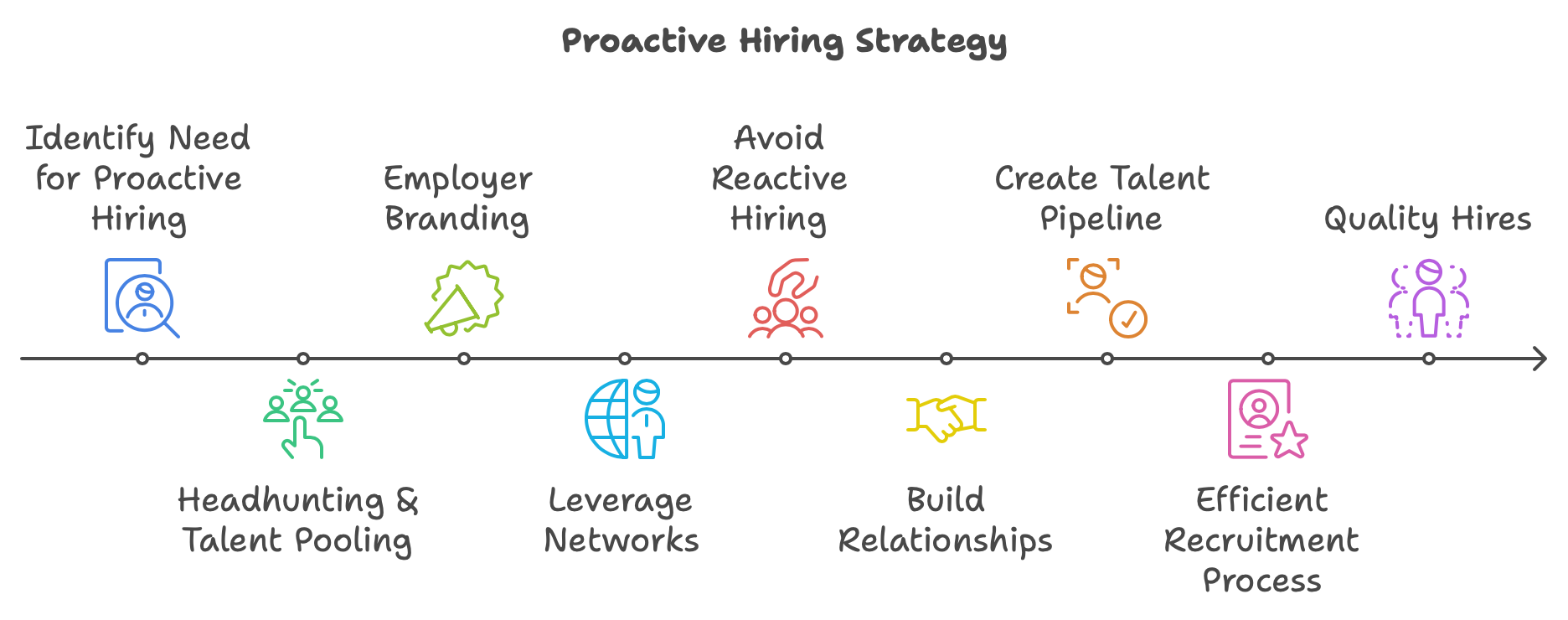Hiring the right person isn’t just about finding someone who checks all the boxes on a list of skills and qualifications.
It’s about finding someone who fits into your company’s unique culture, complements your team’s strengths, and can grow with the role.
Hiring in a rush almost guarantees costly mistakes. It’s better to be patient and thorough in your process, no matter how tempting it is to make a quick decision.
It’s about finding someone who fits into your company’s unique culture, complements your team’s strengths, and can grow with the role.
Hiring in a rush almost guarantees costly mistakes. It’s better to be patient and thorough in your process, no matter how tempting it is to make a quick decision.

How to Hire the Right Employee the First Time
Hiring mistakes can cost more than you think.
When you're looking for a new employee—especially in a hurry - it can feel like you’re under immense pressure. Deadlines loom, clients are getting impatient, and there’s a gaping hole in your team that’s slowing everything down.
At this point, you might be tempted to hire just about anyone who can turn on a computer and not confuse Excel with Instagram.
But hold on. Take a step back, breathe, and maybe grab a cup of tea (or something stronger—no judgment here). Let's talk about how to make the right hire the first time so you won’t end up banging your head against the wall later.
At this point, you might be tempted to hire just about anyone who can turn on a computer and not confuse Excel with Instagram.
But hold on. Take a step back, breathe, and maybe grab a cup of tea (or something stronger—no judgment here). Let's talk about how to make the right hire the first time so you won’t end up banging your head against the wall later.
I know what you’re thinking: “Another article on HR processes... yawn.”
But do you really want to repeat the same mistakes? Remember that one candidate who promised the world in the interview but couldn’t complete a basic task for weeks? Or the friendly, enthusiastic hire who was a perfect fit for the culture but just couldn’t get the job done?
Let’s dig into the entire hiring process, from realizing you need someone new to shaking hands with your perfect new colleague on their first day. I’ll keep it practical, steering clear of dry theory and jargon, and instead focus on real-world examples that’ll help you spot the gold among the fools' gold in the hiring market.
Let’s dig into the entire hiring process, from realizing you need someone new to shaking hands with your perfect new colleague on their first day. I’ll keep it practical, steering clear of dry theory and jargon, and instead focus on real-world examples that’ll help you spot the gold among the fools' gold in the hiring market.
“I Need Someone Fast!” — A Road to Nowhere
Hiring out of desperation is like impulsively buying a mystery box—it rarely ends well. The financial toll of a bad hire goes far beyond just paying a salary to someone who didn’t work out. Here’s a real breakdown of what it costs:

- Time spent searching and interviewing (your hourly rate multiplied by the time invested).
- Training and onboarding (factor in the hours your team members spend getting the new hire up to speed).
- Lost revenue due to the new hire’s subpar performance or mistakes.
- Decreased team morale, which impacts overall productivity.
- Your time and stress (which, honestly, are priceless).
And don’t forget, if you realize the hire was a mistake, you’re back to square one, starting the entire hiring process from scratch. That’s a costly, frustrating cycle.
Read my article about how we help fast-growing businesses do not fall a part with Talent Acquisition - Why Startups Need Fractional HR: Immediate Expertise at a Fraction of the Cost
Read my article about how we help fast-growing businesses do not fall a part with Talent Acquisition - Why Startups Need Fractional HR: Immediate Expertise at a Fraction of the Cost
Preparing for the Search: Do You Really Need Someone?
Before diving into the search for a new employee, ask yourself: “Do we really need another person?” Could the team be trained to work more efficiently? Is there a way to outsource some of the tasks instead? Avoid creating extra roles just because it seems like the obvious solution.
Defining the Ideal Candidate (Without the Rose-Colored Glasses)
If you’ve decided that you truly need to hire someone, it’s time to define the qualities and skills that are absolutely essential. Be realistic:
- Which skills are non-negotiable, and which can be developed later?
- What personality traits are crucial for fitting into your team?
- What experience really matters for the role?
In many good HR departments, there’s a document called a “Hiring Request” that breaks down these factors. It’s a structured way to understand exactly what you're looking for. Remember, you’re hiring a person, not a unicorn. Though, if you do find a unicorn—hire them on the spot!

Writing a Job Description People Will Actually Want to Read
Now comes the fun part: writing the job ad. Let’s make a deal: no more tired phrases like “young, dynamic company” or “fun, friendly team.” People are over it. Instead, get specific:
- Explain exactly what the job entails and what the new hire will be working on.
- Describe real projects and tasks, not just fluff.
- Be honest about the challenges of the role.
- Highlight what makes your company special, and no, offering free coffee or cookies isn’t a real perk anymore.
Learn about how to stand out from competition in hiring right and top talents:
HR Branding: The Key to Attracting Talent and Building Long-Term Loyalty
How Growing and Scaling Businesses Can Attract Top Talent: Proven HR Strategies for Success
Finding That Golden Hire
Now that you’ve clarified what you need, where do you find this ideal candidate?
Proactive Hiring: Stop Waiting, Start Building Your Talent Pipeline
One of the most common hiring mistakes is waiting until there’s an urgent need before starting the recruitment process. Reactive hiring often leads to rushed decisions and costly mistakes. Instead, companies should shift towards proactive hiring—a strategy where you’re always on the lookout for top talent, even if you don’t have a vacancy right now.
Proactive hiring allows you to build relationships with potential candidates early on, so when a position does open, you already have a pool of pre-vetted talent ready to go. Here’s how to get started:
Talent Pooling: Keep an eye out for promising candidates, engage with them, and build relationships long before you need to hire. These candidates may be passive job seekers or individuals who would consider a new role if the right opportunity came along.
Employer Branding: Actively promote your company’s culture and values, so you attract the right kind of candidates even when you’re not actively hiring. A strong employer brand helps candidates think of you as a desirable place to work when they’re ready to move.
Leverage Networks: Regularly engage with your professional network, attend industry events, and stay active on platforms like LinkedIn. The goal is to establish yourself as a company that’s always on the lookout for top talent, rather than scrambling last minute when someone leaves.
This proactive approach saves time, minimizes the risk of bad hires, and ensures you're not making rushed decisions under pressure. It transforms recruitment from a crisis-driven task into a continuous, strategic effort.
Proactive hiring allows you to build relationships with potential candidates early on, so when a position does open, you already have a pool of pre-vetted talent ready to go. Here’s how to get started:
Talent Pooling: Keep an eye out for promising candidates, engage with them, and build relationships long before you need to hire. These candidates may be passive job seekers or individuals who would consider a new role if the right opportunity came along.
Employer Branding: Actively promote your company’s culture and values, so you attract the right kind of candidates even when you’re not actively hiring. A strong employer brand helps candidates think of you as a desirable place to work when they’re ready to move.
Leverage Networks: Regularly engage with your professional network, attend industry events, and stay active on platforms like LinkedIn. The goal is to establish yourself as a company that’s always on the lookout for top talent, rather than scrambling last minute when someone leaves.
This proactive approach saves time, minimizes the risk of bad hires, and ensures you're not making rushed decisions under pressure. It transforms recruitment from a crisis-driven task into a continuous, strategic effort.

Job Boards: A Mixed Bag
Yes, job boards can be helpful. But they’re also crowded with resumes, many of which might seem like they were written by a random word generator. You’ll have to sift through a lot of irrelevant or underwhelming applications. However, if you have the time and patience, you might find a few gems.
Word of Mouth: Your Secret Weapon
Referrals are often the best way to find quality hires. Let your network know that you’re hiring. Post on social media (without sounding desperate). Reach out to former colleagues. Candidates who come recommended are far more likely to be a good fit than someone plucked out of the unknown from a job board.
Reading Resumes Like a Detective
Resumes are more than just a list of dates and job titles - they tell a story. Look for red flags, like frequent job-hopping. Gaps in employment? Try to figure out whether the person was pursuing personal growth or just floundering. Every detail in a resume can give you a deeper insight into the candidate’s true qualifications.
I recommend you to read several article about Red Flags in CVs, they help you to identify not only potential issues, but what questions to ask the candidates:
Resume Red Flags to Avoid: Expert Insights from a Recruiter (Part 1)
Spotting Resume Red Flags: Key Lessons from a Recruiter (Part 2)
Common Resume Mistakes: Red Flags Every Recruiter Notices (Part 3)
My Experience and learning after hiring 1000 candidates into Tech and Innovative Businesses - What I learned after hiring 1000 candidates for technology industry: Organization perspective
I recommend you to read several article about Red Flags in CVs, they help you to identify not only potential issues, but what questions to ask the candidates:
Resume Red Flags to Avoid: Expert Insights from a Recruiter (Part 1)
Spotting Resume Red Flags: Key Lessons from a Recruiter (Part 2)
Common Resume Mistakes: Red Flags Every Recruiter Notices (Part 3)
My Experience and learning after hiring 1000 candidates into Tech and Innovative Businesses - What I learned after hiring 1000 candidates for technology industry: Organization perspective
The Initial Call: Your First Filter
Think of your first phone call with a candidate like the filters on an online shopping site. This call is your chance to screen for essential qualities. Prepare questions that help you quickly determine if the candidate is worth bringing in for a full interview. Ask about their motivation, their understanding of the role, and their salary expectations. If they can’t articulate why they want to work with you, consider it a red flag.
Here are articles about what questions and how to ask:
Questions to Assess Cultural Fit of a Candidate
The Small Business Hiring Guide: 5 Questions to Ensure Team Fit
An Entrepreneur guide to Effective Hiring: How to Master the Recruitment Process
Here are articles about what questions and how to ask:
Questions to Assess Cultural Fit of a Candidate
The Small Business Hiring Guide: 5 Questions to Ensure Team Fit
An Entrepreneur guide to Effective Hiring: How to Master the Recruitment Process
Don’t Settle for the First Person You Like
Even if deadlines are looming, resist the temptation to hire the first halfway decent candidate just because you’re in a rush. It’s far better to take a little more time to find someone right than to spend months dealing with the fallout of a bad hire.
Read more about our experience evaluation process during Talent Acquisition - The Science of Talent Acquisition: How Structured Evaluation Predicts Success
Read more about our experience evaluation process during Talent Acquisition - The Science of Talent Acquisition: How Structured Evaluation Predicts Success
Test Tasks: Keep Them Relevant and Fair
A test task is not an excuse to get free labor (yes, I’m looking at you, startup founders). It’s a chance to see how a candidate thinks and solves problems. Keep it short, relevant to the role, and not something that will require hours of unpaid work.
One more thing, when you found and hired you ideal candidate, I recommend you to follow On-Boarding Guide which is build for getting new hires up to speed fast - Building Success from Day One: A CEO's Guide to Effective Employee Onboarding
One more thing, when you found and hired you ideal candidate, I recommend you to follow On-Boarding Guide which is build for getting new hires up to speed fast - Building Success from Day One: A CEO's Guide to Effective Employee Onboarding
My Thoughts
From my experience, the real cost of a bad hire isn’t just monetary - it’s the toll it takes on team morale and productivity, as well as the hit to your own leadership reputation. Making the right hire the first time is worth every bit of effort you put in upfront. Think of it as an investment in your team’s future success.
How UnitiQ Can Help You Hire Right
At UnitiQ, we specialize in fractional HR services and talent acquisition solutions that go beyond just filling open positions. We help businesses build proactive hiring strategies, ensuring you’re always prepared with a pool of qualified candidates before the need becomes urgent.
By leveraging behavioral evaluations, psychological profiling, and tailored cultural fit assessments, UnitiQ supports companies in making data-driven hiring decisions that align with long-term business goals.
Whether you need ongoing HR support or guidance in creating transparent hiring practices, UnitiQ’s customized solutions help you avoid costly hiring mistakes and build stronger, more resilient teams.
We are happy to help you with Talent Acquisition and HR tasks, please contact me, Olga Fedoseeva, Founder at UnitiQ, directly:
My Telegram
My LinkedIn
By leveraging behavioral evaluations, psychological profiling, and tailored cultural fit assessments, UnitiQ supports companies in making data-driven hiring decisions that align with long-term business goals.
Whether you need ongoing HR support or guidance in creating transparent hiring practices, UnitiQ’s customized solutions help you avoid costly hiring mistakes and build stronger, more resilient teams.
We are happy to help you with Talent Acquisition and HR tasks, please contact me, Olga Fedoseeva, Founder at UnitiQ, directly:
My Telegram
My LinkedIn








